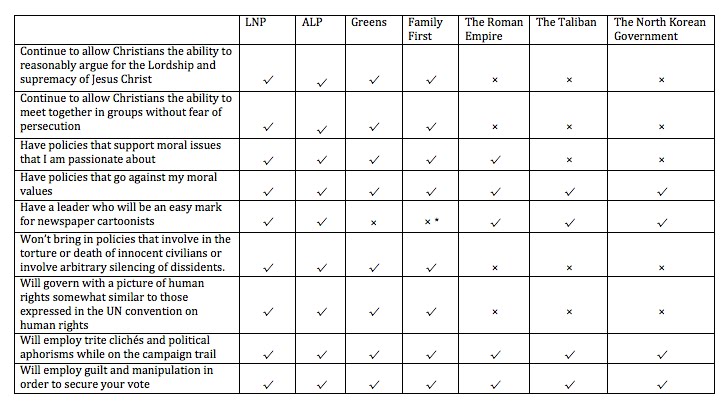A well meaning friend, perhaps unaware of my position on Family First, suggested that I become Facebook Friends with Queensland Senate Candidate Wendy Francis. I have met Wendy (a few years ago), I used to play football (soccer for the luddites) against her son. Anyway. I added her. She seems like a decent, hard working, Godly Christian lady, I’ve no doubt she’s a great mum. I’ve got no doubt she’s a Christian. I’ve got no doubt she’s moral. And I’ve got no doubt she’s intelligent. But I won’t be voting for her. She’ll probably end up somewhere above the Greens and the Australian Sex Party on my ballot paper (I like numbering the senate paper completely. I’m a politics geek. Sue me.). And here’s why. I don’t think she’ll make a good politician. Pretty much by her own admission. If you want a godly, motherly, intelligent amateur holding the balance of power in the senate (which might happen) then feel free to vote for her. I won’t judge you.
She’s been busy on Facebook posting 101 reasons to vote for Wendy Francis. Here are some examples.
#13 I’ve never had media training and I don’t know how to avoid or fudge questions.
#88 I really don’t know quite how to be a politician and I rather suspect I should stay that way and those who vote for me would agree
#71 In a campaign featuring robotic candidates controlled by media minders I’m a fresh contrast. It’s time for un-politicians!
My big problem with the Family First campaign (and its epitomised by Wendy’s appearance on Sunrise) is that they completely lack any form of nuance or any sense that they’ll be, if elected, governing for everybody. Not just the people who vote for them. What they say is fine (almost) coming from the mouths of lobbiests and special interest groups. But this sort of comment from her Facebook profile is just a little scary: “Atheist Prime Minister & atheist Greens with senate balance of power equals the wrong road for Australia”.
I can’t help but think that if she had media minders, or thought like a politician, she may have avoided situations like this.
“legitimising gay marriage is like legalising child abuse”
Comparing anything that’s clearly not in the same category of child abuse to child abuse is like comparing things to Hitler. We have a pretty solid definition of child abuse to work from – and we have myriad victims of child abuse in our community who must feel somewhat slighted by the idea that children with two loving parents are being placed in the same category.
Christians hate it (I know I do) when atheists suggest that Christian parenting is child abuse. So why would we, as Christians, use similar language to describe family structures we disagree with. Even if it wasn’t her who posted the message (and she says it wasn’t, but that it was a staffer) it’s the kind of amateur hour thing she seems to be proud of (based on her points above). And she didn’t distance herself from the sentiment in subsequent interviews. A little media training and political nous goes a long way.
Something can be bad for a child without it being child abuse. This lack of nuance is appalling. Is she saying that any child without a father is suffering abuse? Does it follow that any mother who leaves her husband and becomes a single parent is also an abuser? Or is it only if they leave their husband for another woman?
I sympathise with her position on same-sex couples adopting. But I think it’s a much more complex situation than can be adequately argued or justified on Twitter in 140 characters or less. Is it better for a child to have loving gay parents than no parents? Probably. As soon as you concede that point you’re on the back foot. Coming out with emotive tripe that seems designed purely to cause scandal is a ridiculous political strategy designed only to resonate with the lowest common denominator of Christian thought.
My biggest problem with Family First is that they almost completely fail to empathise with the people they oppose. Christians, by the grace of God and our parliament, enjoy incredible freedom in our country. This kind of “we speak for the majority so we’re going to prevent any minorities being represented” mentality is just scary. You know what happens in cultures that oppress and silence minorities. They start sending them to death camps. There. I made a Hitler comparison.
Politics has famously been described (probably by Churchill) as the art of compromise. By being definitively “non-compromising” and “non-political” you’re essentially saying that you don’t care about the outsider. The people who don’t hold your views. That’s not what being a senator, or being a Christian, is about.





Confessions #5: Sometimes I post here rather than commenting elsewhere
I think blogging time, in my schedule, is a fungible thing. That’s a cool word I just learned. Basically, I have an allocated amount of time for “blogging” and I have to spread that time between writing, reading and commenting.
So sometimes I write lots of posts here and neglect the “community” aspect of blogging. Times like yesterday. Yesterday my blogging comrade and e-friend Ben mentioned a really significant moment. A momentous moment. He sold his house. Without having to go to auction. Which he had expressed concern about. What a relief that must have been for him, and his family. But here’s little old me. Blogging about pointless stuff like Jesus themed thongs. So caught up in my own world that I didn’t comment on his post. Nor did I take the obligatory Monday Quiz.
And now, a day afterwards, I feel guilty because I’ve missed the commenting boat. Other people, who have commented, clearly love Ben more. The only way I can possibly rectify the situation is by trumping a comment with a link. That’s how blog love works. The blug1 beats the comment. It’s like a game of scissors rock paper. The Blug beats the comment. The comment beats the read. And the read must therefore beat the blug – because there’s no point blugging if people aren’t reading.
1A portmanteau2 of blog and plug.
2The strategic mashing together of two words to form one concept. Like Venn diagramming words.
August 10, 2010